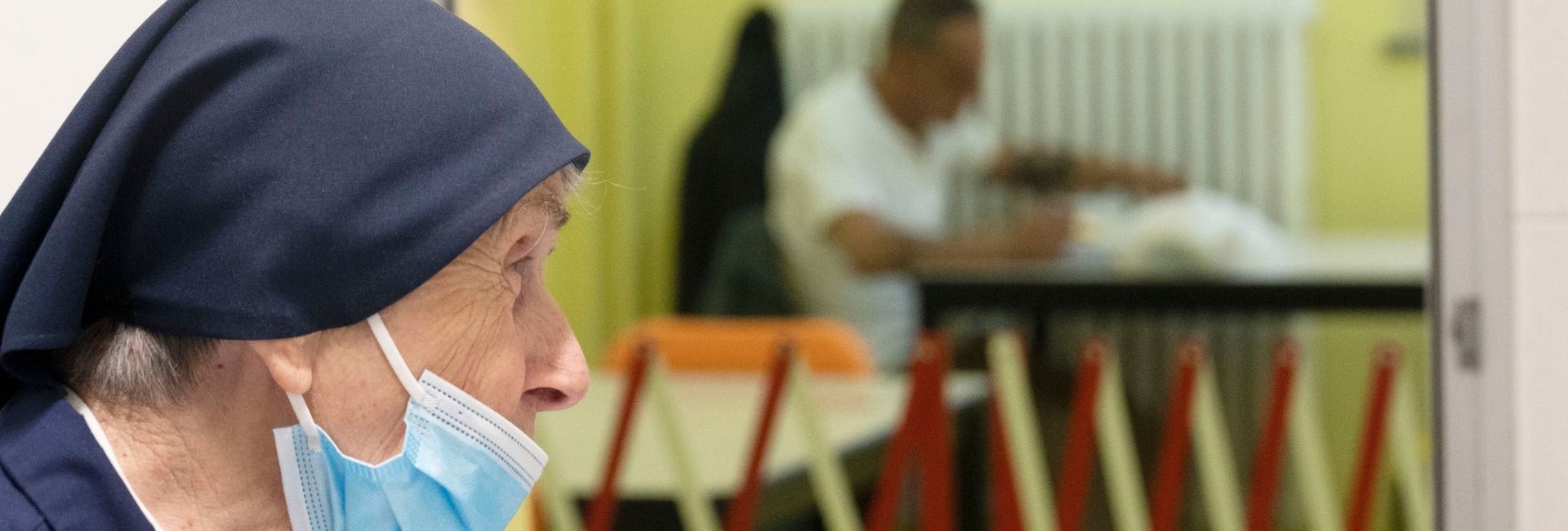Elisabetta Rosso
Via Nizza 24, 7.30 am. There is an open door in the middle of a long yellow building. Someone enters immediately, while others begin to approach, almost all from the centre.
At the entrance to Casa Santa Luisa stands Sister Cristina, wearing a zip-up sweatshirt pulled up to her neck and a grey mitten on her right hand. She greets people, invites them in, knows everyone and welcomes them with a smile, “every morning we serve breakfast to the poor, it is a project that began with the arrival of the Sisters here in 1800, and was then structured with many volunteers from the 1970s onwards”, she explains.
An initiative that Specchio dei tempi and the readers of La Stampa have been financing for over ten years, in which over 500,000 breakfasts have been donated to the most deprived. Thanks to the foundation’s funds, it has been possible to build emergency housing units, a courtyard roof, new toilets, and ensure the necessary food supplies every day. Recently, the foundation donated a van for the transport of foodstuffs and for the needs of the homeless in the area.
In fact, Casa Santa Luisa is not just a canteen, “we have showers, clothes, a clinic, we start with breakfast, but to start a recovery project, we want to make people who are a bit lost understand that they are worthwhile and we are here to help them. We accompany them on a path towards autonomy and we try to create spaces for socialising, we want them not to feel alone, abandoned”, explains Sr Cristina, then a young man interrupts her, he is 30 years old, from Bangladesh, he has just entered and asks her about his guitar, “It’s here”, replies Sr Cristina pointing to the cage, “I have tuned it for you”.
The structure of the refectory in Via Nizza reflects the intentions of the project. Coloured benches are scattered around the large, airy courtyard. The kitchen feels like home. The shiny white tiles, the enormous tin teapot placed in the middle of the table, and Donata, who, wearing a green embroidered apron, hands out the coffee and says: “I have my own method for making it taste good. I’m eighty years old and I’ve been volunteering here for 21 years, it makes me happy“.
The breakfast counter is rich and varied. “We too, at times, had to give ready-made bags, but as soon as it was possible we went back to letting everyone choose what they prefer. After all, when you go to the bar, they don’t decide for you what to eat,” explains Sr Cristina. Further along the corridor there is a small room with a bookcase and some chairs, then a small lounge where the volunteers prepare for the service, then the shower room, and at the end the surgery. More than 40,000 breakfasts are served in St. Louise House every year, and in the pre-Covid period there were more than 50,000.
The faces of the refectory guests are all different, of all ages, nations, religions, and each one carries a story that is difficult in its own way. “There is the elderly man who has had arguments with his family and finds himself alone, foreign children sent to Italy because they were inconvenient and created problems, those who are mentally challenged and need to be cared for, even graduates who have lost their jobs, families and homes. Everyone must see themselves as valuable human beings“. There is real and continuous listening between the courtyard and the counter, a strong feeling of community that leads to imagining new goals.
“For now we are serving breakfast, but there is an idea to do activities in the afternoon. It’s a project we already had in mind and now that the pandemic has slowed down we are beginning to talk about it again, also with Specchio dei tempi,” concludes Sr Cristina. Steps are being taken to enlarge Casa Santa Luisa and make it even more welcoming, even if the dream of the Vincentian Sisters remains the same: to one day open the door of Via Nizza 24 and find no one there.

